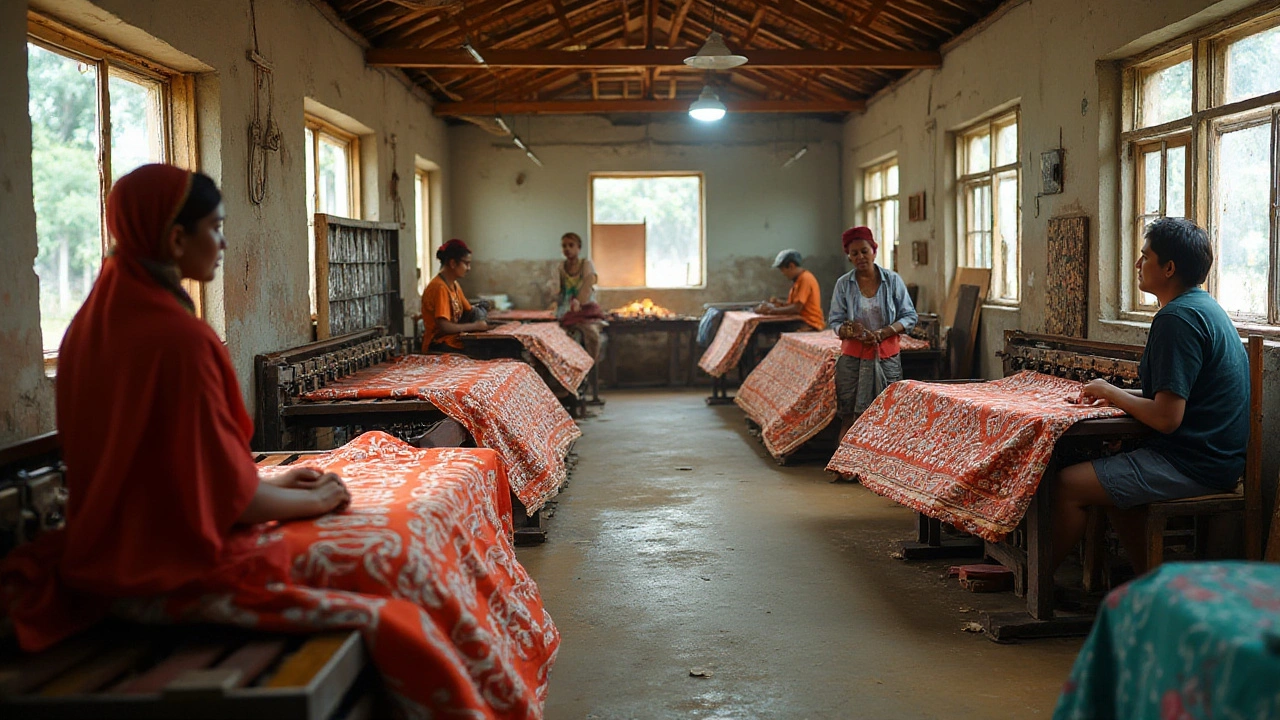In the dynamic world of business, small scale manufacturing is a cornerstone for many budding entrepreneurs. These enterprises often begin in garages or small workshops, eventually growing into impactful ventures. The question of which industry hosts the most small businesses is understandably a common curiosity among potential business owners.
Small scale manufacturing captures the essence of creativity and innovation. Industries varying from artisanal crafts to local food production thrive, driven by passionate individuals. They fill a unique niche, providing personalized products that larger manufacturers frequently overlook. The relationship between small businesses and manufacturing industries can lead to fruitful opportunities, spurred by adaptability and creativity.
Exploring which industries open the most doors for small-scale manufacturers reveals insights into potential paths for entrepreneurship. Let's navigate through these choices, understanding how each can offer both challenges and rewards for small business ventures.
- Understanding Small Scale Manufacturing
- Popular Industries for Small Scale Manufacturing
- Advantages of Small Scale Manufacturing
- Challenges Faced by Small Businesses
- Tips for Thriving in Small Scale Manufacturing
Understanding Small Scale Manufacturing
Small scale manufacturing is a fascinating sector, combining the ingenuity of individual entrepreneurs with the traditional roots of manufacturing. At its core, it involves the production of goods on a smaller scale compared to large industrial operations. It is often characterized by personalized products and highly customized processes. This sector includes businesses that range from crafting handmade jewelry to producing artisanal foods or boutique clothing. Entrepreneurs in this industry leverage their skills and creativity to turn raw materials into finished products, often showcasing a rare blend of art and utility.
Understanding small scale manufacturing also means recognizing its role in supporting local economies. These businesses employ local artisans, utilize regionally sourced materials, and often prioritize sustainable practices. This focus not only contributes to environmental goals but also resonates with consumers who value eco-friendly and locally made products. The diverse nature of small scale manufacturing businesses reflects a growing consumer demand for products with a story, a direct connection to the maker, rather than anonymous mass-produced goods.
The Small Business Administration once highlighted, "Small businesses are the lifeblood of our economy, sparking innovation and providing opportunities for many entrepreneurs to fulfill their dreams." This sentiment captures the essence of small scale manufacturing where passion and purpose often intersect.
Several factors contribute to the success of small scale manufacturers. First is the scalability aspect. These businesses can start small and gradually expand their scale of operation as demand increases. This flexibility allows them to adapt quickly to market changes, a significant advantage over larger, less agile competitors. Technology also plays a crucial role by offering tools and platforms that enhance efficiency, from inventory management systems to digital marketing strategies that target the right audience effectively. Entrepreneurs in this field often rely on these tech tools to streamline operations and expand their reach without significant up-front investment.
Characteristics of Small Scale Manufacturing
Small scale manufacturers often operate with limited resources, which encourages innovation and resourcefulness. They are typically labor-intensive and need multitasking capabilities. This often results in a tight-knit team environment where everyone's contributions are vital. Despite the smaller scale, these businesses can produce high-quality products that command a premium price point. Quality over quantity is a hallmark of small scale manufacturing. This approach aligns well with consumers' growing preference for artisanal, locally-made products that tell a story. This creates a unique selling proposition for small businesses in competitive markets.
Interestingly, data suggests that a large percentage of small businesses fall into this category. They account for an increasingly significant share of new business ventures each year. According to industry reports, many small-scale manufacturers manage to survive the treacherous first few years and continue to expand, contributing significantly to job creation. These businesses often occupy niche markets that large manufacturers overlook, which allows them to flourish without direct competition from mass-market brands. Understanding these dynamics helps potential entrepreneurs identify untapped opportunities and build sustainable businesses in the world of small scale manufacturing.
Popular Industries for Small Scale Manufacturing
Small scale manufacturing offers diverse opportunities across various sectors, encouraging individuals to pursue entrepreneurial ventures. A prominent industry is handmade crafts, which benefits from an increasing demand for personalized and unique items. This industry allows artisans to showcase their creativity, transforming raw materials into products that carry personal touches, often reflecting cultural heritage or innovative design ideas. Items like pottery, jewelry, and hand-woven textiles find a loyal customer base, and with platforms like Etsy, artisans connect directly with consumers, eliminating middlemen and increasing profit margins.
Another thriving area within small scale manufacturing is the food production industry. The rise of health-conscious consumers has fueled the demand for organic and locally-sourced products, making this a lucrative field for small businesses. From homemade jams and sauces to baked goods and specialty cheeses, food production caters to niche markets with specific dietary preferences. Joining farmer's markets or local grocery stores often helps these small manufacturers reach their local communities effectively, fostering a supportive relationship with consumers who prefer knowing the origins of their food. A well-known resource, the National Small Business Association, notes, "Food-based small businesses often see success due to increasing consumer awareness of sustainable practices."
The personal care and cosmetics industry also hosts numerous small businesses. There's a growing preference for natural skin care and beauty products devoid of harsh chemicals. Entrepreneurs in this space find success creating handcrafted soaps, creams, and oils, often highlighting eco-friendly practices and organic ingredients, which are appealing to conscious consumers. By leveraging platforms such as social media, these businesses have an avenue to present their story and ethos, aligning their brand with the values of their audience. Through collaborations and community engagements, they can penetrate markets that are often overshadowed by large brands.
Small scale manufacturing also thrives in the technology and electronics sphere. With rapid advancements in tech, entrepreneurs are finding niches in developing innovative gadgets or components that larger corporations might overlook. Small teams can be agile, adapting quickly to changes and trends, such as developing sustainable tech solutions or unique home automation devices. A table may clarify how these industries compare:
| Industry | Potential Market Growth | Initial Investment |
|---|---|---|
| Handmade Crafts | High | Low |
| Food Production | Moderate to High | Moderate |
| Personal Care | High | Low to Moderate |
| Technology | High | High |
Understanding each industry's nuances can guide small businesses towards areas of significant growth and opportunity. Building not just on trends but also on personal passion and capability could make the difference between merely surviving and truly thriving in the competitive world of small scale manufacturing.

Advantages of Small Scale Manufacturing
Small scale manufacturing is a dynamic sector offering vast potential for growth and personal satisfaction. One of the most significant benefits lies in the degree of flexibility it offers to entrepreneurs. Unlike large operations, small manufacturing businesses can quickly adapt to changes in consumer preferences, allowing them to stay relevant in a rapidly shifting market. Coupling this flexibility with the ability to produce niche products that larger manufacturers might overlook, small businesses often find themselves filling unique gaps in the market. The adaptability inherent in these manufacturers means they can easily pivot to new ideas without the heavy burden of extensive infrastructure changes, a boon to entrepreneurial spirits looking to innovate the landscape.
A crucial advantage of this small scale manufacturing is the lower startup costs associated with launching such a venture. Compared to large manufacturers, smaller operations require less investment in machinery and facilities, making it more accessible for entrepreneurs. This accessibility is amplified by the supportive role that technology plays. With advancements in digital tools and machinery, production processes are more streamlined and efficient, offering even the smallest players competitive capabilities. This democratization of technology enables small businesses to produce high-quality products at lower costs, thus enhancing their ability to compete with larger enterprises.
Another compelling benefit is the close-knit relationships with customers that small businesses in small scale manufacturing can build. These manufacturers often engage directly with their clientele, which helps in building trust and loyalty. This relationship fosters a sense of community and identity around their products, a critical component in securing brand loyalty. For instance, niche food manufacturers can cater to dietary restrictions or preferences, providing personalized options that are not typically available from mass producers. This customization can establish a strong bond between the manufacturer and the customer, ensuring repeat business and valuable word-of-mouth referrals.
Environmental sustainability is an increasingly important consideration for consumers—and small scale manufacturers are often at the forefront of this movement. With their capacity to implement environmentally friendly practices on a smaller, more manageable scale, these businesses can adopt sustainable methodologies that larger companies might struggle to integrate. Whether through sourcing local materials, reducing waste, or using eco-friendly packaging, these manufacturers respond effectively to the growing demand for sustainable products. A
small scale manufacturing expert once noted, "Our operations are not only about making products but making a difference, which resonates deeply with our ethos and our customers."Such practices are not only beneficial for the planet but can also serve as a powerful marketing tool, attracting environmentally conscious consumers looking for products aligned with their values.
Economically, small scale manufacturing contributes significantly to job creation and local economies. By fostering local talent and keeping production within communities, they contribute to regional development and skill enhancement. According to recent statistics, small manufacturers account for a significant percentage of employment in the manufacturing sector, highlighting their role as a backbone of economic growth. This contribution to the economy is not just about numbers; it's about empowering people and providing a platform for skills development, which in turn, fuels entrepreneurial success stories and inspires future innovation. This synergy between small business entrepreneurship and local economic impact underscores the vital role played by small scale manufacturing, ensuring it remains a thriving and essential part of the economic landscape.
Challenges Faced by Small Businesses
Navigating the world of small businesses in the manufacturing industry is not without its challenges. Aspiring entrepreneurs often face a myriad of obstacles that test their resilience and adaptability. One of the prominent issues is securing adequate funding. Traditional financing options like banks are sometimes hesitant to invest in small-scale manufacturing due to perceived risks or lack of collateral. As a result, business owners need to explore alternative financing, such as microloans, crowdfunding, or personal savings. Additionally, these businesses often struggle with maintaining cash flow, as income from initial sales might not meet immediate operational costs.
Another significant hurdle is competition, not only from other small businesses but also from larger, well-established manufacturers. The competitive landscape demands that small businesses carve out a niche by offering unique or high-quality products that differentiate them from mass-produced items. This differentiation often requires innovation and creativity, both of which demand time and resources. Moreover, small businesses must continually adapt to evolving market trends and consumer preferences, a task much easier when operating in a flexible small scale setup.
The regulatory environment also presents numerous challenges. Compliance with local, state, and federal regulations can be overwhelming, particularly for those venturing into industries like food production or chemical manufacturing. These regulations are in place to ensure safety and quality, but their complexity often requires small business owners to seek external expertise or allocate significant time to understand and implement necessary compliance measures. Navigating these legal waters without missteps is crucial to avoid penalties and ensure the longevity of the business.
"One of the most significant issues faced by small business owners is dealing with regulatory complexity, which tends to favor established companies with legal departments," remarked a report by the Small Business Association.
There’s also the matter of scaling operations. Small businesses initially benefit from a lean infrastructure, but as demand grows, they face the challenge of scaling up without losing their personal touch or risking their quality standards. Hiring skilled labor becomes a pressing need, yet attracting and retaining top-tier talent on limited budgets can be challenging. Proper training and investing in workplace culture are crucial strategies that these businesses must employ to succeed.
Finally, small businesses often have limited access to advanced technology and tools that can enhance productivity and efficiency. The cost of cutting-edge machinery or software solutions can be prohibitive, making it essential for business owners to prioritize their investments wisely. Leveraging affordable technology and finding creative workarounds can give small scale manufacturing businesses a competitive edge and ensure sustainability, even in industries dominated by giants.

Tips for Thriving in Small Scale Manufacturing
Small scale manufacturing offers unparalleled opportunities for innovation and creativity. To thrive, first and foremost, having a clear business plan is essential. This plan should cover product design, production processes, marketing strategies, and financial projections. By reaching for clarity and precision in every aspect, small business owners can better navigate potential challenges. Moreover, tapping into local resources and networks can provide invaluable support. From sourcing materials to hiring skilled labor, connections within the community can reduce costs and increase operational efficiency. Entrepreneurs should not overlook the importance of quality control. Keeping the quality of products consistently high can distinguish a small business amid the competition.
Small businesses should embrace technology to stay competitive. From utilizing advanced machinery to employing efficient software solutions for inventory and sales, technology can streamline operations. Adopting digital tools doesn't merely mean improving production; it's about enhancing customer experiences too. For instance, having a user-friendly website or an active social media presence helps in marketing and connecting with consumers. A well-considered online strategy could lead to higher engagement and broader market reach. Revenue streams can be diversified by offering online sales, enabling businesses to tap regional and international markets. Staying updated on market trends and technological advancements is not just an option but a necessity for sustained success in small scale manufacturing.
One crucial aspect often underestimated is environmental sustainability. As customers grow more eco-conscious, sustainable practices can impact business reputations positively. Employing recycled materials, reducing waste, and utilizing energy-efficient processes not only lower the environmental footprint but can also lower operational costs over time. By promoting these green practices, small businesses can also tap into a market segment eager to support eco-friendly products. As Guy Kawasaki, a notable entrepreneur, once pointed out, "Great companies start because the founders want to change the world, not make a fast buck," reminding us that aligning business practices with broader ethical values can foster loyalty and long-term growth.
Finally, managing finances prudently is crucial. Many small business owners underestimate the importance of financial literacy. Understanding cash flow, maintaining proper accounts, and investing wisely in both people and equipment can dictate the survival and growth of a business. Keeping a pulse on financial health ensures that funds are available for necessary improvements and unexpected costs. Networking with other small businesses, attending workshops, and seeking mentorship are excellent ways to build knowledge and share experiences. Perseverance, combined with smart strategies and a community-oriented mindset, is key to thriving in the competitive landscape of small scale manufacturing.

